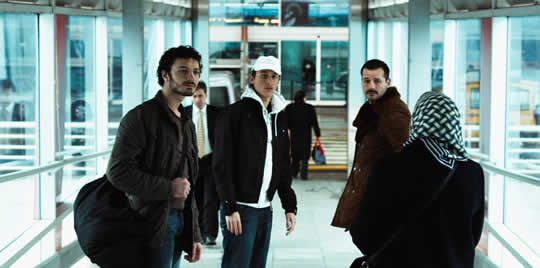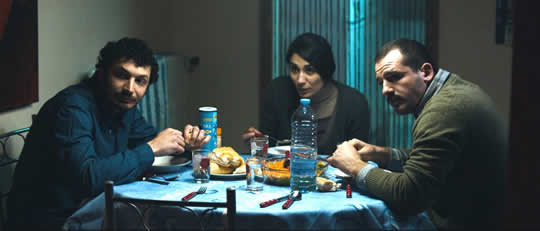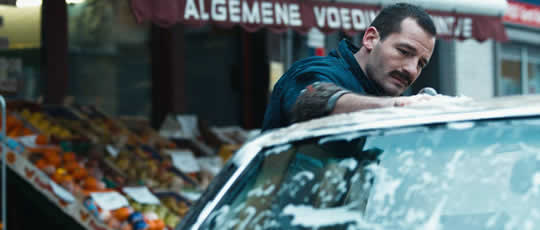 TURQUAZE is story of Timur (28) and his two brothers, Ediz (36) and Bora (16) that after burying their father in Istanbul, return to Ghent. Their mother remains in Istanbul. The three brothers resume their lives but need to find a new balance. While Ediz plays the dominant father and Bora does silly things with the wrong friends, Timur tries to fulfil his father’s dream: playing the trumpet in a brass band. Sarah, Timur’s girlfriend, thinks it’s cool, until she realises how little he seems to notice her now…
TURQUAZE is story of Timur (28) and his two brothers, Ediz (36) and Bora (16) that after burying their father in Istanbul, return to Ghent. Their mother remains in Istanbul. The three brothers resume their lives but need to find a new balance. While Ediz plays the dominant father and Bora does silly things with the wrong friends, Timur tries to fulfil his father’s dream: playing the trumpet in a brass band. Sarah, Timur’s girlfriend, thinks it’s cool, until she realises how little he seems to notice her now…
TURQUAZE presents a disarmingly honest chronicle of a Turkish family’s life in Ghent … Turkish for beginners!
Kadir Balcı director of TURQUAZE (born in Ghent, 1970) graduated from the Royal Academy of Fine Arts in Ghent with a Master’s degree in Audiovisual Arts. Kadir spent two years as a guest student in the film department at Bournemouth & Poole College for Art & Design in the UK where he also produced a short film. As a director, his credits include corporate films (Virgin Express, Microsoft Belux), video clips and an animation film (Par Terre) as well as films for museums and theatre companies. In 2008, he co-directed the Flemish television series ‘180’. Turquaze’ kadir’s first full-length film was part of the Recent Belgium Cinema screening series in Los Angeles organized by the Consulate General of Belgium in Los Angeles, in cooperation with Flanders Image and Wallonie Bruxelles Images, with the support of E.L.M.A. (European Languages and  Movies in America).
Movies in America).
Bijan Tehrani: I’d like to start off by asking, how did you come up with the idea for making Turquaze?
Kadir Balci: The idea came about four years ago; I had already finished Film College six years prior, and at that point I did not do anything with film because I wanted to stay away from it. But the moment I started to know that I wanted to create something, I immediately started thinking of my own story—I’d say sixty or seventy percent of the film stems from my own life experiences, so I felt that I could tell the story that I know best. So I set off to tell a story about my family, my friends, and the close people around me, and that is how I came up with this story.
BT: Tell me briefly about what the main concept of Turquaze is.
KB: At the time I was constantly working on and thinking about identity. The conflict of identity has been following me since I was born. Since I could think consciously, I’ve asked the question, “Who am I?” This question was prominent in my life because people were always talking about me being a Turk while I was in Belgium, and while I was in Turkey they saw me as a Belgian; so I felt confused and wondered, “Why don’t I belong anywhere?” Belonging nowhere made me want to tell the story.
BT: Is it advantageous to be from both cultures?  KB: Well most people say it is an advantage, but I believe that there is a disadvantage with it—it goes 50/50. I’ve been living with it my whole life and my turning point was when I accepted who I am and that I am really living between two cultures. I got to learn about it and deal with it, and I believe that I still ask my self everyday, “Who am I?”, the identity question. This can be a disadvantage, but the advantage is that there is so much richness and culture with it, and that is priceless.
KB: Well most people say it is an advantage, but I believe that there is a disadvantage with it—it goes 50/50. I’ve been living with it my whole life and my turning point was when I accepted who I am and that I am really living between two cultures. I got to learn about it and deal with it, and I believe that I still ask my self everyday, “Who am I?”, the identity question. This can be a disadvantage, but the advantage is that there is so much richness and culture with it, and that is priceless.
BT: How did you go about the casting Turquaze?
KB: It was quite difficult! Finding the main actor was the most difficult part because there were hardly any Turkish-speaking people living in Belgium, let alone one who can also act in front of a camera. One day, my producer said “You have been searching for sixth months and looking too far, and your brother is a good fit for the role!” I felt that my brother and I had a different relationship that came with my culture, so I was apprehensive, but I approached him anyway. We tried it and he was suited really well for the role—afterward, it was really easy to find the other parts.
BT: How did you work with the actors, did you do a lot of rehearsals?
KB: For most of the actors, I asked for a week of rehearsals. During this week, we worked very hard on body language for the film and speech for the dialogue that would suit the film and tell the right story. It was hard, but we really found the way of telling something while acting.
BT: With this method, did you give the actors any chances to improvise on the set? 
KB: I didn’t give them much time to improvise because we did not have much time to shoot; only about twenty five days, but I did give them time in the rehearsals. However, once we made a consensus there, I wanted to follow that consensus. I would make an exception if they gave me something that was very strong on-set and in the beginning of the day, because I don’t say “Let’s do this!” with finality, I just say that they should give me what they feel. If they feel it does not work, I take a break and try to work on that part.
BT: How much of the film was made in the editing room?
KB: Everything was formed before the shoot. I spent a lot of time creating the mood and a vision of how it should look and how the scenery should feel. Once we had a meeting with all of the key crew members, I showed them all of my notes and they really understood what I was trying to say. After the first few days, we were all happy and it was well aligned with the mood. Within a few days we all developed our own language to tell the story of the film that I had in my mind.
BT: How did you go about choosing the music for your film?
KB: I don’t like it when a film’s music is over-done. I am always afraid for that because sometimes I see a film that is so strong, but they put so much music under it that all the feelings are gone, This was very hard to balance because many films here are musical and there is music all of the time, so I decided that music would not play a  part in a scene unless it was necessary to convey our message. So when it is about music, we include it, but when music is not necessary, I don’t want any of it in the film. So we had this big contrast between silence and music and that told my story very well.
part in a scene unless it was necessary to convey our message. So when it is about music, we include it, but when music is not necessary, I don’t want any of it in the film. So we had this big contrast between silence and music and that told my story very well.
BT: How has Turquaze been received by audiences?
KB: Very well, actually. We only had eight copies in Belgium, which is pretty unusual for such a small film in Belgium, and it was a small Flemish/Turkish movie on that level, so that got a lot of attention. The reception of the film has been very positive.
BT: Are you planning your next film?
KB: Yes, I am actually writing a new film with another producer. I just want to know how other producers work before I go back to my first producer. We are working on a tragic comedy, and the heaviness is more on the comedy and is more about people with my background.
BT: That sounds very promising. Thank you for speaking with us, and good luck!

